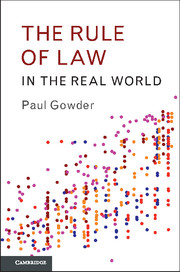Book contents
- The Rule of Law in the Real World
- The Rule of Law in the Real World
- Copyright page
- Dedication
- Contents
- Acknowledgments
- Introduction
- Chapter 1 The rule of law: a basic account
- Chapter 2 The strong version of the rule of law
- Chapter 3 Generality and hierarchy
- Chapter 4 Egalitarian liberty and reciprocity in strategic context
- Chapter 5 Isonomia: The dawn of legal equality
- Chapter 6 The logic of coordination
- Chapter 7 Parliament, Crown, and the rule of law in Britain
- Chapter 8 The logic of commitment
- Chapter 9 The role of development professionals: measurement and promotion
- Conclusion
- Notes
- References
- Index
- References
References
Published online by Cambridge University Press: 05 February 2016
- The Rule of Law in the Real World
- The Rule of Law in the Real World
- Copyright page
- Dedication
- Contents
- Acknowledgments
- Introduction
- Chapter 1 The rule of law: a basic account
- Chapter 2 The strong version of the rule of law
- Chapter 3 Generality and hierarchy
- Chapter 4 Egalitarian liberty and reciprocity in strategic context
- Chapter 5 Isonomia: The dawn of legal equality
- Chapter 6 The logic of coordination
- Chapter 7 Parliament, Crown, and the rule of law in Britain
- Chapter 8 The logic of commitment
- Chapter 9 The role of development professionals: measurement and promotion
- Conclusion
- Notes
- References
- Index
- References
Summary
- Type
- Chapter
- Information
- The Rule of Law in the Real World , pp. 249 - 270Publisher: Cambridge University PressPrint publication year: 2016
- Creative Commons
- This content is Open Access and distributed under the terms of the Creative Commons Attribution licence CC-BY-NC-ND 4.0 https://creativecommons.org/cclicenses/



